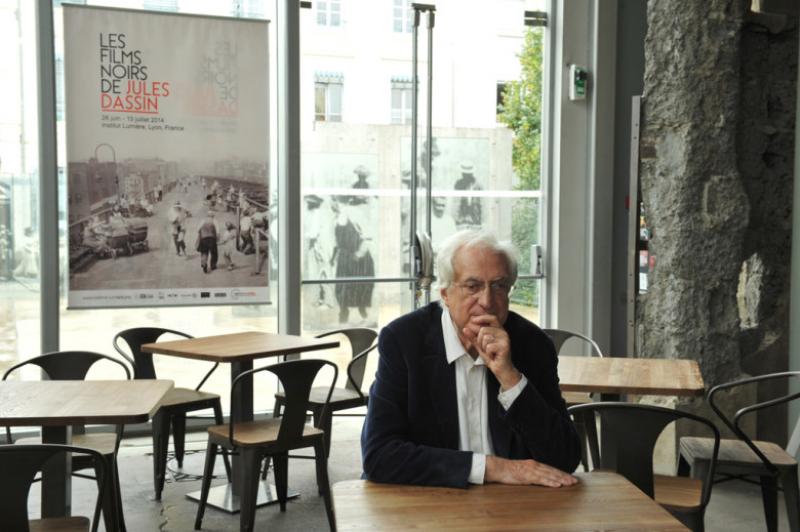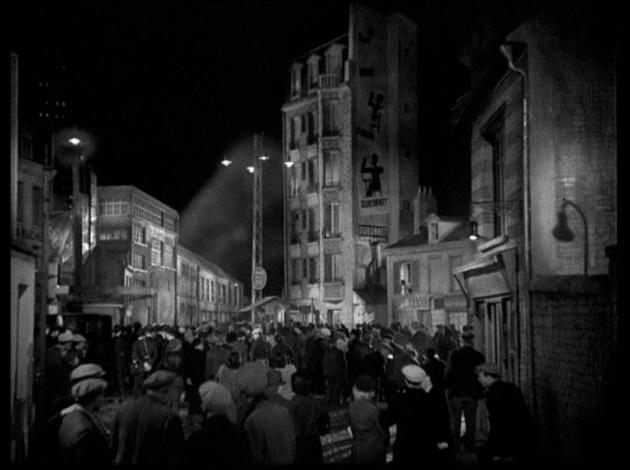DVD: A Journey Through French Cinema | reviews, news & interviews
DVD: A Journey Through French Cinema
DVD: A Journey Through French Cinema
A film-lover's hymn to French movies: Bertrand Tavernier’s 'Voyage à travers le cinéma français'

Bertrand Tavernier’s trip through French cinema is shot through with the love of someone who has grown up with cinema and knows how to communicate his passion in a way that is totally engaging. The three hours-plus that he delivers make you want to plunge back into the classics, as well as start discovering many underrated or forgotten directors, actors, DoP’s or film score composers.
What makes the documentary so good is his 100% personal approach – although he is touchingly modest and includes contributions from many of his professional colleagues. It is not a completist’s bible or an attempt at cinema-historical balance. Rather like David Thomson’s unreservedly subjective and opinionated Biographical Dictionary of Film, this is a treasure trove of enthusiasms, presented with a keen knowledge of what underpins the language of great cinema. Tavernier celebrates well-known directors such as Jacques Becker, Jean Renoir, Marcel Carné, Jean-Pierre Melville and Claude Sautet, but he focuses as well on lesser-known directorial talents such as Edmond T Gréville who split his remarkable career between England and France, and many of whose masterpieces, such as Menaces or Brief Ecstasy aren’t available on DVD.
 The recurrent figure in Tavernier’s pantheon is Jean Gabin, the French acting icon from the 1930s through to the early 1960s, much more subtle than Depardieu in his depiction of the ordinary Frenchman. As Tavernier demonstrates with many carefully chosen clips, enhanced by an always eye-opening and thought-provoking commentary, Gabin was as fine an actor as any, not just the personification of a nation’s better self.
The recurrent figure in Tavernier’s pantheon is Jean Gabin, the French acting icon from the 1930s through to the early 1960s, much more subtle than Depardieu in his depiction of the ordinary Frenchman. As Tavernier demonstrates with many carefully chosen clips, enhanced by an always eye-opening and thought-provoking commentary, Gabin was as fine an actor as any, not just the personification of a nation’s better self.
There are delightful quirks, such as his celebration of the tough-guy actor Eddie Constantine, best-known to British audience for his ironic self-referential role in Godard’s Alphaville, but a regular fixture in a series of often very violent gangster films of the 1950s, which Tavernier greatly enjoyed. He rhapsodises as well about Maurice Jaubert, the film composer, not least the score he wrote for Jean Vigo’s classic L’Atalante. In describing the way in which Jaubert managed to add a dramatic dimension to key scenes of the films he worked on, rather than just fill gaps, Tavernier gives us a lesson in film technique, just as he does in describing the outstanding work of other craftsmen working in the medium.
The film is never didactic, although always surprisingly informative. Tavernier’s exploration of French cinema is made entertaining by a wealth of revealing anecdotes – not least, during the making of Le jour se lève, designer Alexandre Trauner’s insistence that Carné and his producers build an extra floor onto the house (pictured above) which plays such a crucial part in the drama. What stands out perhaps most of all is an extraordinary generosity of spirit – this is a man who can speak about others in his profession with great respect, rare in a milieu where ego rules a great deal of the time. That generosity is contagious: this is a film where the man’s love of the medium is fully shared with his audience. Highly recommended to anyone interested in le cinéma français.
Overleaf: watch the trailer for A Journey Through French Cinema
Bertrand Tavernier’s trip through French cinema is shot through with the love of someone who has grown up with cinema and knows how to communicate his passion in a way that is totally engaging. The three hours-plus that he delivers make you want to plunge back into the classics, as well as start discovering many underrated or forgotten directors, actors, DoP’s or film score composers.
What makes the documentary so good is his 100% personal approach – although he is touchingly modest and includes contributions from many of his professional colleagues. It is not a completist’s bible or an attempt at cinema-historical balance. Rather like David Thomson’s unreservedly subjective and opinionated Biographical Dictionary of Film, this is a treasure trove of enthusiasms, presented with a keen knowledge of what underpins the language of great cinema. Tavernier celebrates well-known directors such as Jacques Becker, Jean Renoir, Marcel Carné, Jean-Pierre Melville and Claude Sautet, but he focuses as well on lesser-known directorial talents such as Edmond T Gréville who split his remarkable career between England and France, and many of whose masterpieces, such as Menaces or Brief Ecstasy aren’t available on DVD.
 The recurrent figure in Tavernier’s pantheon is Jean Gabin, the French acting icon from the 1930s through to the early 1960s, much more subtle than Depardieu in his depiction of the ordinary Frenchman. As Tavernier demonstrates with many carefully chosen clips, enhanced by an always eye-opening and thought-provoking commentary, Gabin was as fine an actor as any, not just the personification of a nation’s better self.
The recurrent figure in Tavernier’s pantheon is Jean Gabin, the French acting icon from the 1930s through to the early 1960s, much more subtle than Depardieu in his depiction of the ordinary Frenchman. As Tavernier demonstrates with many carefully chosen clips, enhanced by an always eye-opening and thought-provoking commentary, Gabin was as fine an actor as any, not just the personification of a nation’s better self.
There are delightful quirks, such as his celebration of the tough-guy actor Eddie Constantine, best-known to British audience for his ironic self-referential role in Godard’s Alphaville, but a regular fixture in a series of often very violent gangster films of the 1950s, which Tavernier greatly enjoyed. He rhapsodises as well about Maurice Jaubert, the film composer, not least the score he wrote for Jean Vigo’s classic L’Atalante. In describing the way in which Jaubert managed to add a dramatic dimension to key scenes of the films he worked on, rather than just fill gaps, Tavernier gives us a lesson in film technique, just as he does in describing the outstanding work of other craftsmen working in the medium.
The film is never didactic, although always surprisingly informative. Tavernier’s exploration of French cinema is made entertaining by a wealth of revealing anecdotes – not least, during the making of Le jour se lève, designer Alexandre Trauner’s insistence that Carné and his producers build an extra floor onto the house (pictured above) which plays such a crucial part in the drama. What stands out perhaps most of all is an extraordinary generosity of spirit – this is a man who can speak about others in his profession with great respect, rare in a milieu where ego rules a great deal of the time. That generosity is contagious: this is a film where the man’s love of the medium is fully shared with his audience. Highly recommended to anyone interested in le cinéma français.
Overleaf: watch the trailer for A Journey Through French Cinema
rating
Explore topics
Share this article
Add comment
The future of Arts Journalism
You can stop theartsdesk.com closing!
We urgently need financing to survive. Our fundraising drive has thus far raised £49,000 but we need to reach £100,000 or we will be forced to close. Please contribute here: https://gofund.me/c3f6033d
And if you can forward this information to anyone who might assist, we’d be grateful.

Subscribe to theartsdesk.com
Thank you for continuing to read our work on theartsdesk.com. For unlimited access to every article in its entirety, including our archive of more than 15,000 pieces, we're asking for £5 per month or £40 per year. We feel it's a very good deal, and hope you do too.
To take a subscription now simply click here.
And if you're looking for that extra gift for a friend or family member, why not treat them to a theartsdesk.com gift subscription?
more Film
 The Mastermind review - another slim but nourishing slice of Americana from Kelly Reichardt
Josh O'Connor is perfect casting as a cocky middle-class American adrift in the 1970s
The Mastermind review - another slim but nourishing slice of Americana from Kelly Reichardt
Josh O'Connor is perfect casting as a cocky middle-class American adrift in the 1970s
 Springsteen: Deliver Me From Nowhere review - the story of the Boss who isn't boss of his own head
A brooding trip on the Bruce Springsteen highway of hard knocks
Springsteen: Deliver Me From Nowhere review - the story of the Boss who isn't boss of his own head
A brooding trip on the Bruce Springsteen highway of hard knocks
 The Perfect Neighbor, Netflix review - Florida found-footage documentary is a harrowing watch
Sundance winner chronicles a death that should have been prevented
The Perfect Neighbor, Netflix review - Florida found-footage documentary is a harrowing watch
Sundance winner chronicles a death that should have been prevented
 Blu-ray: Le Quai des Brumes
Love twinkles in the gloom of Marcel Carné’s fogbound French poetic realist classic
Blu-ray: Le Quai des Brumes
Love twinkles in the gloom of Marcel Carné’s fogbound French poetic realist classic
 Frankenstein review - the Prometheus of the charnel house
Guillermo del Toro is fitfully inspired, but often lost in long-held ambitions
Frankenstein review - the Prometheus of the charnel house
Guillermo del Toro is fitfully inspired, but often lost in long-held ambitions
 London Film Festival 2025 - a Korean masterclass in black comedy and a Camus classic effectively realised
New films from Park Chan-wook, Gianfranco Rosi, François Ozon, Ildikó Enyedi and more
London Film Festival 2025 - a Korean masterclass in black comedy and a Camus classic effectively realised
New films from Park Chan-wook, Gianfranco Rosi, François Ozon, Ildikó Enyedi and more
 After the Hunt review - muddled #MeToo provocation
Julia Roberts excels despite misfiring drama
After the Hunt review - muddled #MeToo provocation
Julia Roberts excels despite misfiring drama
 Ballad of a Small Player review - Colin Farrell's all in as a gambler down on his luck
Conclave director Edward Berger swaps the Vatican for Asia's sin city
Ballad of a Small Player review - Colin Farrell's all in as a gambler down on his luck
Conclave director Edward Berger swaps the Vatican for Asia's sin city
 London Film Festival 2025 - Bradley Cooper channels John Bishop, the Boss goes to Nebraska, and a French pandemic
... not to mention Kristen Stewart's directing debut and a punchy prison drama
London Film Festival 2025 - Bradley Cooper channels John Bishop, the Boss goes to Nebraska, and a French pandemic
... not to mention Kristen Stewart's directing debut and a punchy prison drama
 London Film Festival 2025 - from paranoia in Brazil and Iran, to light relief in New York and Tuscany
'Jay Kelly' disappoints, 'It Was Just an Accident' doesn't
London Film Festival 2025 - from paranoia in Brazil and Iran, to light relief in New York and Tuscany
'Jay Kelly' disappoints, 'It Was Just an Accident' doesn't
 Iron Ladies review - working-class heroines of the Miners' Strike
Documentary salutes the staunch women who fought Thatcher's pit closures
Iron Ladies review - working-class heroines of the Miners' Strike
Documentary salutes the staunch women who fought Thatcher's pit closures
 Blu-ray: The Man in the White Suit
Ealing Studios' prescient black comedy, as sharp as ever
Blu-ray: The Man in the White Suit
Ealing Studios' prescient black comedy, as sharp as ever

Comments
Absolutely agree with this
Thank you very much for